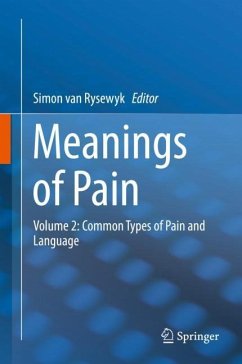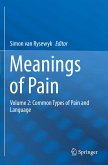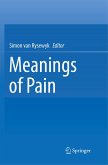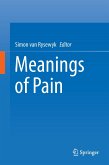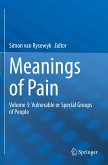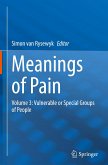Experiential evidence shows that pain is associated with common meanings. These include a meaning of threat or danger, which is experienced as immediately distressing or unpleasant; cognitive meanings, which are focused on the long-term consequences of having chronic pain; and existential meanings such as hopelessness, which are more about the person with chronic pain than the pain itself.
This interdisciplinary book - the second in the three-volume Meanings of Pain series edited by Dr Simon van Rysewyk - aims to better understand pain by describing experiences of pain and the meanings these experiences hold for the people living through them. The lived experiences of pain described here involve various types of chronic pain, including spinal pain, labour pain, rheumatic pain, diabetic peripheral neuropathic pain, fibromyalgia, complex regional pain syndrome, endometriosis-associated pain, and cancer-related pain. Two chapters provide narrative descriptions ofpain, recounted and interpreted by people with pain.
Language is important to understanding the meaning of pain since it is the primary tool human beings use to manipulate meaning. As discussed in the book, linguistic meaning may hold clues to understanding some pain-related experiences, including the stigmatisation of people with pain, the dynamics of patient-clinician communication, and other issues, such as relationships between pain, public policy and the law, and attempts to develop a taxonomy of pain that is meaningful for patients. Clinical implications are described in each chapter.
This book is intended for people with pain, their family members or caregivers, clinicians, researchers, advocates, and policy makers.
This interdisciplinary book - the second in the three-volume Meanings of Pain series edited by Dr Simon van Rysewyk - aims to better understand pain by describing experiences of pain and the meanings these experiences hold for the people living through them. The lived experiences of pain described here involve various types of chronic pain, including spinal pain, labour pain, rheumatic pain, diabetic peripheral neuropathic pain, fibromyalgia, complex regional pain syndrome, endometriosis-associated pain, and cancer-related pain. Two chapters provide narrative descriptions ofpain, recounted and interpreted by people with pain.
Language is important to understanding the meaning of pain since it is the primary tool human beings use to manipulate meaning. As discussed in the book, linguistic meaning may hold clues to understanding some pain-related experiences, including the stigmatisation of people with pain, the dynamics of patient-clinician communication, and other issues, such as relationships between pain, public policy and the law, and attempts to develop a taxonomy of pain that is meaningful for patients. Clinical implications are described in each chapter.
This book is intended for people with pain, their family members or caregivers, clinicians, researchers, advocates, and policy makers.

